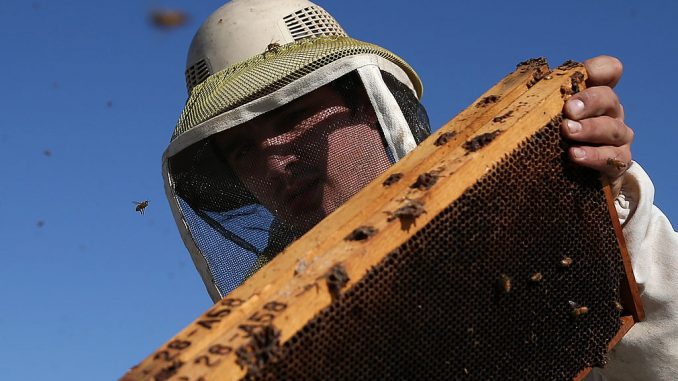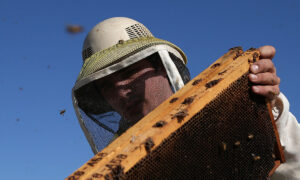

To beekeep or not to beekeep? That was the question posed recently to the City Council in Mission Viejo, California.
An ordinance to allow and regulate residential beekeeping within city limits failed to pass after citizens and councilmembers expressed concerns about public safety at a May 11 meeting.
“We’ve heard a pretty big outcry against this ordinance, and I feel we owe it to our residents to back them up,” Mayor Trish Kelley said. “I’m looking out for the health and safety of our Mission Viejo families and residents.”
Before the motion failed on a 4-1 vote, the council considered several arguments in favor of residential beekeeping that cited benefits to the community and the environment. But public opinion weighed in on the dangers the bees presented to citizens, especially children, ultimately swaying the decision.
‘A Safer Environment’
Bee activist Maya Cappellino, a high school student from Ladera Ranch, pleaded for the council to pass the ordinance during the public comments section of the meeting.
“I urge you to listen to the research, listen to the experts, and listen to the science, and cast your vote tonight based on facts versus emotions,” said Cappellino.
The motion represented a two-year journey she led to raise awareness about the community benefits of residential beekeeping, she said, adding that the presence of domestic bees would limit the number of wild beehives, and thereby curtail swarms and bee stings.
“Allowing for domesticated bees that can be managed by responsible beekeepers will … actually provide a safer environment for Mission Viejo residents,” Cappellino said.
Laguna Niguel resident Teresa Carr said her family began maintaining their own hives two years ago to help foster growth in their fruit trees. In the first year, they produced 50 pounds of honey, and began distributing fruits and vegetables around the neighborhood.
“That’s where I’ve seen the growth and the plus [side],” she said.
Ron Vanderhoff, vice president of Roger’s Gardens in Newport Beach, urged the council to be a leader in Orange County, where beekeeping is not permitted at the county level but allowed within some cities, with restrictions.
“These fruits and vegetables don’t come from Albertsons—they come from, in many cases, your yards and your neighbor’s yard. We need pollination [and] honey bees serve that function. This is the way the natural world works,” Vanderhoff said.
Avram Grossman, an Irvine-based beekeeper for over a decade, explained how he’s used his practice to dispel preconceived fears over bees. He invites children from the neighborhood over to have a look.
“Kids just love to get up there and look at the bees, and watch them go in and out of the hive,” he said.
“There’s so much information out there about bees that are positive. … I can’t overemphasize the importance of what having backyard beekeeping allowed. … It’s a huge contribution to the environment.”
Dangerous and Irresponsible
Councilmember Greg Raths noted that none of those who supported the ordinance and shared their passion for the benefits of beekeeping were residents of the city.
He was elected by the people of Mission Viejo to represent them, he said. “And from what I’ve been hearing within the community over the last year … they’re not in favor of this.”
The emailed comments in opposition to the ordinance outnumbered those in support by a 2-to-1 ratio. Of the 63 comments the city received, according to City Clerk Kimberly Schmitt, 42 were against beekeeping.
“I can’t understand why the city would consider allowing beehives on residential properties. It’s dangerous, irresponsible, and could be litigious if someone is seriously hurt,” wrote one resident, who’d lived in the city for over 40 years.
Another 30-year resident wrote about the nuisances of a neighborhood beekeeper, saying his young children had been stung often, and citing poor landscaping maintenance from the city due to the population of thousands of bees.
The Bee Man
One of the more harrowing public comments came from city resident Jerry “The Bee Man” Bryant, owner and CEO of a bee, wasp, and yellow jacket removal company.
“I speak from experience. I don’t speak from textbooks,” said Bryant, who has been working with hives since 1977. “I beg you: Do not pass this ordinance.”
He shared a story about how he came to the rescue of a young girl who was attacked by bees, even though she didn’t provoke them. He had to use a knife to scrape the stingers out of her skin as quickly as possible.
“I got them all out. I calmed her down. She shouldn’t have been there. Those bees shouldn’t have been there. They belonged to a beekeeper,” Bryant said.
He asked the council to imagine a grandchild that runs out and hits a beehive that someone put in their backyard for pleasure. “Can you imagine going and picking her up and taking her to the hospital because she’s dying?” he asked.
He added that the four hours of beekeeping classes that would be required by the city’s ordinance would be insufficient. “I’d say [you need] a year. Then you might be qualified to know how they operate, how they think, how they move, why they move.”
He added: “I’m not afraid of bees. I live with them. I am trying not to be overly dramatic. It’s just that I’m very experienced.”
Mission Viejo resident Christy relies on local honey to help her combat environmental allergies. She said Bryant’s “fear mongering” was “pretty disheartening.”
“I’ve got 52 fruit trees on my property and I rely on bees to pollinate, as do my neighbors,” Christy said. “For those that are allergic, you’re more likely to get stung by feral bees currently flying around your neighborhood, not from the bees from the beekeeper.”
Community Beekeeping
Councilmember Brian Goodell suggested an alternative option.
“I mentioned an idea to create something like a community garden approach to beekeeping,” he said. “I support the idea of having bees kept in Mission Viejo, I’m just not sure they should be kept in close proximity to people’s homes.”
Liz Savage, president of the Orange County Beekeepers Association, said similar approaches have been taken in Long Beach, where bees are rescued and rehabilitated, and Victorville, which is “maintained by a specific group [and] very much controlled.”
“You’re not allowed to just go in there anytime you want,” she said.
Ed Sachs, the sole councilmember who voted in favor of the ordinance, said he was “trying to understand the rationale for why that works.”
“So you’re not OK with the bees being kept in people’s yards, but you are OK with them being … next to the animal shelter or close to the dog park, or certainly close to other homes that border the Arroyo?” he asked.
Goodell said that “the bees are here anyhow.”
“From my perspective, it’s just that the hives would not be located directly over the wall from your backyard,” he said. “I think it would be very good for the community to have domesticated bees in hives, tended by a caring and knowledgeable beekeeper. … But I just don’t know that I’d want it to be in someone’s backyard [who] doesn’t like them.”





Be the first to comment